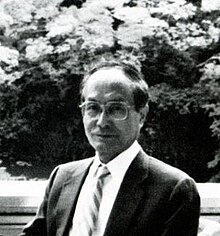Kōji Nakano (writer)
Kōji Nakano | |
|---|---|
 Nakano Kōji | |
| Born | 1 January 1925 Ichikawa, Chiba, Japan |
| Died | 16 July 2004 |
| Occupation | Novelist, translator, literary critic |
| Genre | |
Template:Japanese name Kōji Nakano (中野 孝次, Nakano Kōji, 1 January 1925 – 16 July 2004) was a Japanese novelist, translator of German literature and literary critic in Showa period Japan.
Biography
Nakano was born in Ichikawa city, Chiba Prefecture, as the son of a carpenter. He was a graduate of the German literature department of Tokyo University in 1950. From 1952-1981, he worked as a professor at Kokugakuin University.
Nakano was noted for his translations of the works of Franz Kafka and Hans Elrich Nosack into the Japanese language.
In 1976, he published a collection of essays, Buryugeru e no tabi (“Journey to Bruegel”), which he followed by an autobiographical series of books: Mugi Uru hi ni (When the Wheat Ripens, 1978), Nigai Natsu (“Bitter Summer”, 1979) ad Kisetsu no owari (“The End of the Season”, 1980). He won numerous literary awards in his career, cumulating with the Japan Art Academy Award in 2004.
